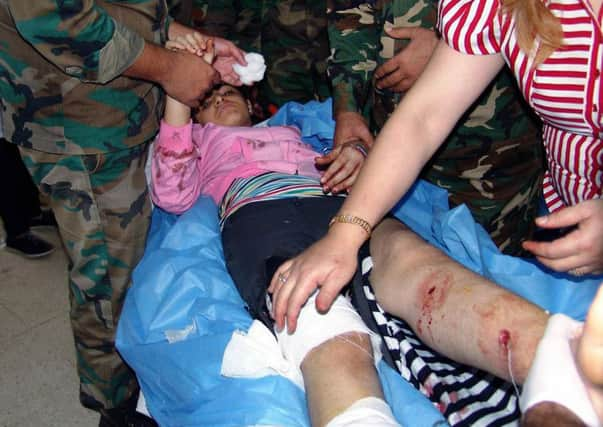Mary Creagh: We cannot wash our hands of the Syrian people's ordeal


I stood in a sandstorm on the Beka’a valley on the road to Damascus, just 12 miles from Bashir Assad’s presidential palace. I certainly felt very close to everything that was happening. A charity worker from Islamic Relief said to me that just six miles away there were jihadi fighters.
I had been live tweeting a lot of photos from the camps and at that point I thought it best to turn off the geo-location from the Twitter account and not do any tweeting until we got back to our safe haven of Beirut. I must admit that I felt like a bit of a coward doing that.
Advertisement
Hide AdAdvertisement
Hide AdWhat we know about Syria is that 400,000 people have been killed in this humanitarian catastrophe, five million Syrian refugees have fled their country and eight million more are displaced within its own borders.
They are fleeing the terror of Assad, IS and now Russia. I met a woman called Hadia who told me how her husband was killed in Homs while working as a Red Cross volunteer. The UN had offered to take her and her children to Germany, but she declined because her mother was unable to accompany them. Four of her adult children are still trapped in Homs. Cases like Hadia’s demonstrate the terrible choices refugees face: you lose your husband, you bring your mother with you and then you are forced to leave your mother behind in order to seek safety for your children.
I also met a man who had a pacemaker fitted in Damascus and who, upon his return to Lebanon, was deregistered as a refugee because he had left freely and returned. This left him and his wife destitute. He was 65 years old and unable to work. He was destitute, lying on his back in a camp.
The vulnerability of those refugees in the Beka’a valley and elsewhere in Lebanon is growing. Their food allocation has been cut. They are on pretty much starvation rations, capped at five family members. I met 10-year-old girls labouring for seven hours a day in the fields, earning $4 a day and working one hour a day just to pay the rent for their family to pitch a little ragged tent on a disused onion factory. Those children’s childhoods have been stolen. Eight million people have been displaced internally in Syria, having suffered attacks from cluster munitions and chemical weapons, and the collective punishment of siege warfare.
Advertisement
Hide AdAdvertisement
Hide AdAt the last meeting of the all-party group on Syria that I attended with the then Batley & Spen MP, Jo Cox, we heard about 60,000 people disappearing and their families paying extortionate sums of money for news of their loved ones or just to receive their bodies for burial.
We are seeing Assad carry out the extermination of his people. Eleven per cent of Syria’s population – two million people – have been wounded or injured, and we have seen the terrible suffering of Syria’s children.
In August 2013, the House of Commons voted against military action in Syria. I shared the regret of many on our side (Labour) at our cowardice on that occasion. We are now living with the consequences of that inaction. That vote was prompted by a sarin gas attack on civilians in eastern Damascus that killed 1,400 people, 426 of whom were children.
The UN doctrine of the responsibility to protect allows military intervention to protect civilians from genocide and war crimes by their state and provides a valid legal basis for intervention. That responsibility to protect weighs upon us as heavily today as it did on that August day in 2013, when, after the vote, we went home, turned on our televisions and saw that Assad had carried out a napalm attack on a school. Using chemical weapons on sleeping children is a war crime. We know all the reasons for that vote, but we now know that we have to protect civilians from Assad and, now, from Russian intervention as well.
Advertisement
Hide AdAdvertisement
Hide AdWe know that the airstrikes that we are carrying out against them in Iraq and Syria, backed by a coalition of 67 countries, are slowly pushing them back in Iraq, but they will never be defeated in Syria until this conflict is sorted.
I want to hear more from the Foreign Secretary about what plans he has for further sanctions against Russia, but we cannot hide behind the fog of war. Washing our hands like Pontius Pilate and choosing not to act is no strategy at all.
I was too scared to tweet from the Syrian border, but brave people in Syria are tweeting their lives and filming the deaths of others. Omar Ibrahim is a neurosurgeon, removing bomb fragments from the brains of children on the floor of a destroyed hospital, and one of 30 doctors left in eastern Aleppo. Bana Alabed, a seven-year-old girl from eastern Aleppo, tweeted last week. She wanted to live like the children of London: “No bombing!” It is not too late for us to save Omar and Bana. They are relying on us. We need to do what we should have done in 2013. We need a no-fly zone over the city of Aleppo and the skies of Syria. Omar and Bana are watching. We must not let them down again.
Mary Creagh is the Labour MP for Wakefield who spoke in a Commons debate on the Syria crisis. This is an edited version.